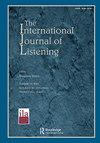ACOUSMATIC LISTENING AND A CRITICAL AWARENESS OF PLACE
Q1 Arts and Humanities
引用次数: 3
Abstract
The akousmatikoi (ἀκουσματικοί) were the probationary pupils of the philosopher Pythagoras. Akousmatikoi were required to sit in silence while Pythagoras delivered his lecture from behind a screen or curtain. In the “Pythagorean pedagogy, [...] the master provided lessons to his students from behind draped material in order to not distract from the voice and to lend it a rather divine authority” (Pettman, 2011, p. 142). Contemporary communication research has disproven this assumption; body language and eye contact inflect communication, carry important information, and assist in understanding. We would never rob a pupil of visual information on the grounds that it distracts from auditory information. But in this peculiar Pythagorean practice, there are lessons to be learned for listening research. Sound and auditory environment researcher Murray Schaeffer used it as metaphor, inspiring what he calls “acousmatique,” or acousmatic, listening. Below, I will describe the “acousmatic situations” that typify everyday life. Then, I will describe “acousmatic listening” as an intentional practice, one that will enable critical reflection on listening. Finally, I will point toward an increased awareness of place that follows from acousmatic listening, an increased awareness of place that inspires this collection of reflections on ethics, listening and place.听觉和对地点的批判意识
akousmatikoi(ἀκςσματικςί)是哲学家毕达哥拉斯的见习学生。当毕达哥拉斯在屏风或幕布后面演讲时,阿库斯马蒂科伊被要求安静地坐着。在“毕达哥拉斯的教育学中,[…]大师从覆盖的材料后面为他的学生提供课程,以避免分散对声音的注意力,并赋予它一种相当神圣的权威”(Pettman,2011142)。当代传播学研究已经否定了这一假设;肢体语言和眼神交流影响交流,传递重要信息,有助于理解。我们决不会以视觉信息干扰听觉信息为由剥夺瞳孔的视觉信息。但在毕达哥拉斯的这种特殊实践中,听力研究也有一些经验教训。声音和听觉环境研究人员Murray Schaeffer将其用作隐喻,激发了他所说的“听觉”或听觉倾听。下面,我将描述日常生活中典型的“听觉情境”。然后,我将把“听觉听力”描述为一种有意的练习,一种能够对听力进行批判性反思的练习。最后,我将指出,从听觉倾听中产生的对地方的意识的增强,对地方的认识的增强,激发了对道德、倾听和地方的思考。
本文章由计算机程序翻译,如有差异,请以英文原文为准。
求助全文
约1分钟内获得全文
求助全文
来源期刊

International Journal of Listening
Arts and Humanities-Language and Linguistics
CiteScore
4.70
自引率
0.00%
发文量
16
 求助内容:
求助内容: 应助结果提醒方式:
应助结果提醒方式:


